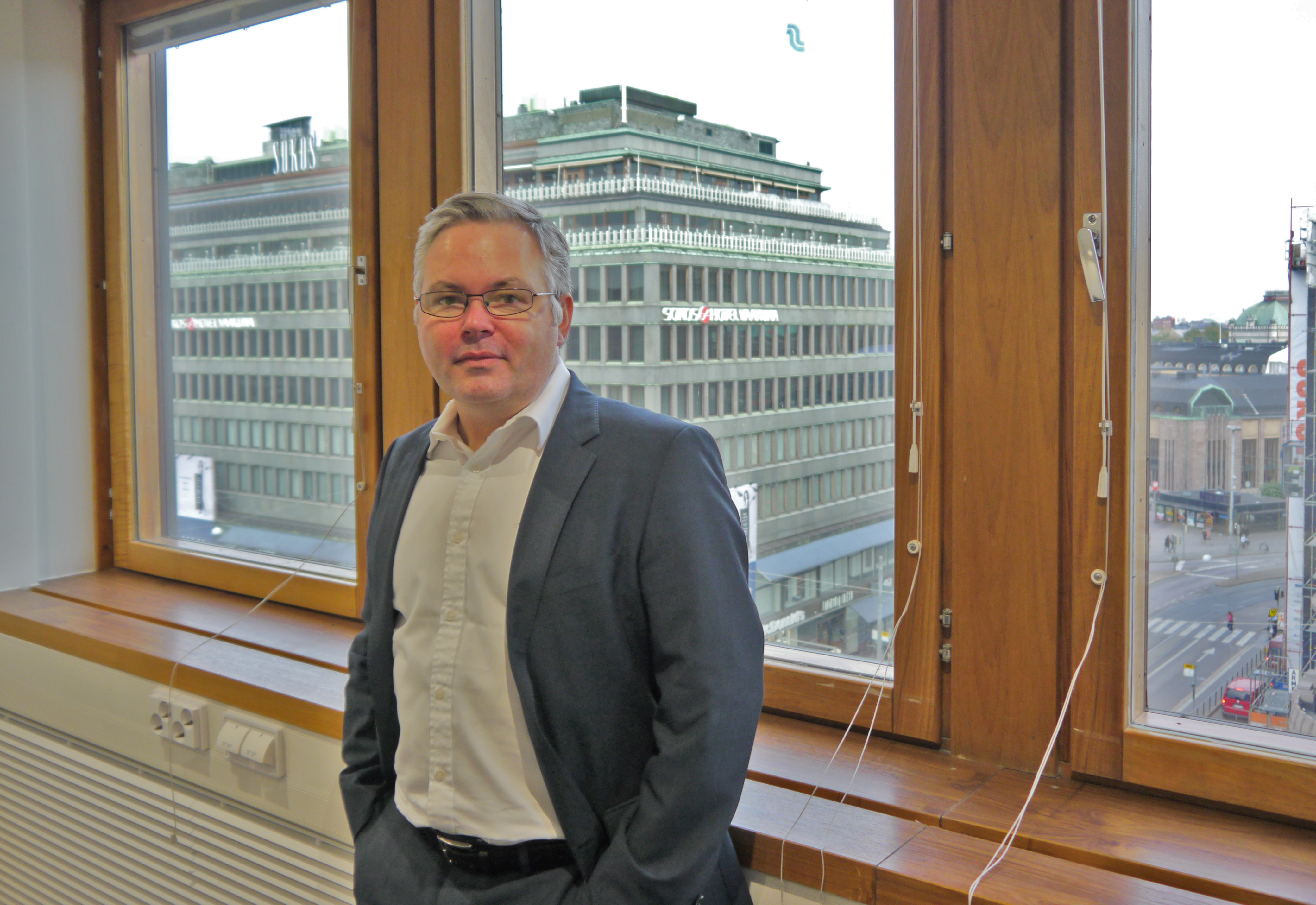Today, Sitecore is one of the major players in the global web CMS market, but in the beginning of 2000 it was just another CMS out there. In this interview, one of the founders, Lars F. Nielsen, tells the story of Sitecore and how the company view the global CMS marketplace. Lars visited Helsinki in the beginning of October when CMS Expert Group Europe had its latest meeting, hosted by North Patrol.
North Patrol is a consulting firm specialized in the design of digital services and information systems. We shape ideas into a vision and service concept, find the best architectural and technological solutions, design a functional user experience, and compete to find the ideal partner for implementation work. We do not sell implementation projects, nor do we sell licenses; we are genuinely on the side of the customer.

This article is a part of CMS selection article series by North Patrol.
North Patrol helps customers to make smart technology decisions and find the best implementation partners. Typically, we facilitate prestudy projects and evaluate vendors and proposals. Most of our clients are large companies headquartered in Finland.
Sitecore definitely has some characteristics that make it a very unique CMS product. For example, Sitecore targeted global markets from day one, and it is still one of the bravest innovators in the CMS space. With more than 800 employees, it’s also one of the biggest CMS companies in the world.
This Danish CMS might not be the cheapest or the most flexible one, but one has to respect their approach to building better tools for digital marketing people. Sitecore’s style of building everything from ground bottom up themselves is also notably different from other big players, such as Oracle or Adobe, who have made many acquisitions to be able to claim a similar set of capabilities.
1) Brief history of Sitecore: What have been the major milestones for Sitecore?
"Sitecore was founded in 2001. It was a spin-off from a consultancy company. Of the original founders, four of us moved into, - and are still working at Sitecore in various roles ranging from core research, marketing and to Michael, our CEO. Lately we extended our owner group with TCV who now have a large minority share at Sitecore.
The first milestone for Sitecore happened right in the beginning when we decided to deliver dynamically assembled pages and content. At that time, most major players were publishing to static HTML files. As computer scientists, we didn’t want to do static HTML publishing, we wanted dynamic pages.
The second milestone was in 2004 when we opened our US office. That was something we had planned already from the founding of Sitecore. It also differentiates us from most other Danish companies. Usually, Danish companies go to Norway, Sweden, Finland—and then onwards to Germany, perhaps UK. Sitecore started from the US, continued to the UK, then to Australia and the Netherlands.
One of the big reasons for this kind of route was that we did everything in English from the start—all the documentation, all the software. In Denmark it is fine to do everything in English, also in the Netherlands this is OK. That is why the Netherlands was our first non-native English country besides our home country. We knew that if we’d gone to Germany or Japan, we would have had to invest in localization and hire local people. As we grew organically all the time, we could not afford that level of investments at that time.
The third milestone was in 2007. Back then, everything was going really well, but one day, one of the founders, Michael, announced, “The CMS market is dead”. He questioned our focus on building just a “typewriter for the web”. After reviewing the situation, we decided to put more effort into helping our clients communicate with their customers. Back then, the market already had social, analytics and marketing automation, but they were separately from the website. We decided to merge all into one system.
We knew we did not have the money to acquire those businesses, so we decided to build them ourselves. The main reason, however was that we were able to build a unified architecture, - one platform. But it wasn’t easy. Those we spoke to said we were crazy—and to certain extent, they were right!
So yes, we were crazy nerds, but also pragmatic people. We knew that businesses do not use all the features in software. Users use consistently maybe 35% of the features available. We initially just needed to build the most important features into our platform.
In 2009, we launched our online marketing suite. Personally I think it changed the market somewhat. We had done something that no one else had. Many of our peers are now doing something similar, but they usually use the approach of integrated best-of-breed systems."
2) What are your strongest markets right now?
"The largest market for Sitecore is the North America. Represented most places in Europe; our strongest footholds are in Germany, NL and UK. Naturally, also in Denmark, but even in Denmark, we are not monopolistic. We don’t think we have to be dominant in any market. There are many very different kinds of companies out there and not everyone needs our approach.
In terms of new market growth, Asia is growing fast."
3) Who are your competitors?
"There are global competitors, and there are local competitors. As local competitors, like here in Finland or in Sweden or Norway, we see EPiServer most frequently as competitor. They have a strong Scandinavian emphasis.
On a global scale, we face Adobe and Oracle. As us, they also have a presence most places, which is important for global enterprises.
Many markets have a great number of local competition. Germany has strong local competition, and Japan is also a good example of strong local competition. This is still a very fragmented market, and it is good to have a variety of systems in this space. There are many different kinds of companies with very different requirements. The day we think Sitecore is a good fit for everyone is the day when we lose the game."
4) What are typical license deals for you in the US and in Europe?
"It varies by requirements and maturity. We do not differentiate pricing for regions, but requirements in terms of capabilities and scalability in US mean often a starting license fee around 100,000 US dollars. In Scandinavia requirements often is different and therefore we see license fees at around 50,000 euros, but we have many different models for the license."
5) Can you estimate a typical implementation cost?
"Typically, the implementation cost is something between four and five times the license cost. For example, if a client pays 100,000 euros for the license, the implementation can cost 400,000 euros. That would be a relatively large implementation for Scandinavia.
The implementation cost can also be proportional to the maturity level of the customer. If the customer organization is very mature in their digital marketing and they know very well what it is that they want to achieve, the implementation cost can be a lot smaller than in cases where the customer is only taking their first steps."
North Patrol’s view of Sitecore:
Being a Danish company, Sitecore could easily be seen as a strong competitor for EPiServer, but Sitecore’s focus has very strongly been on other markets than Scandinavia. This is evident especially in its fairly small number of deeply experienced integrators. Finland, in particular, has a very limited integrator network for Sitecore: only a couple of integrators that have small teams of Sitecore developers (Avanade and Innofactor). Also Creuna (Finland) and Tietotalo are listed as partners, but don't have much implementation experience of Sitecore. Therefore, Sitecore is often very hard to recommend to clients, even though the client’s requirements would be a good fit. Often EPiServer and Drupal simply have superior partner availability with solid reference cases.
The key differentiator of Sitecore is the capability to build a truly integrated platform. Especially in very demanding concepts that combine requirements from digital marketing, complex web publishing and eCommerce, Sitecore is hard to compete with. In simpler or less integrated concepts, EPiServer and Drupal usually win the top positions.
From a Scandinavian perspective, Sitecore can be seen as a true high-end CMS for very demanding digital marketing and eCommerce concepts where an integrated analytics and recommendation engine is a top-priority requirement. In those scenarios our recommendation to clients is to evaluate Sitecore very thoroughly. For simpler scenarios, there usually are better options in terms of partner availability and cost-efficiency.


